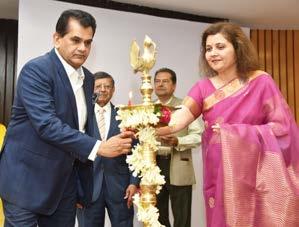
17 minute read
IILM’s 12th Distinguished Global Thinker Award
IILM’s 12th Distinguished Global Thinker Shri Amitabh Kant, CEO NITI Aayog
The IILM's 12th Distinguished Global Thinker Award was conferred on Shri Amitabh Kant, CEO of National Institution for Transforming India (NITI Aayog) and a member of the Indian Administrative Service, IAS (Kerala Cadre, 1980 batch). Mrs Malvika Rai, Chairperson, IILM and Professor Jagdish Sheth, who was IILM’s 11th Distinguished Global Thinker in 2018, presented the award to Shri Amitabh Kant. The Global Thinker Award launched in 2006 celebrates and honours distinguished individuals who have contributed substantially to the global stream of consciousness, ideas and knowledge, and have made a significant difference in the national and global community. In the past years, IILM has conferred the Global Thinker Award on Lord Bhikhu Parekh, Dr M S Swaminathan, Professor C K Prahalad, Mr Sam Pitroda, Lord Meghnad Desai, Dr Shashi Tharoor, Professor Andre Beteille, Professor Soumitra Dutta, Mr Naveen Jain, Professor Ashish Nanda and Professor Jagdish Sheth. This year IILM honoured Shri Amitabh Kant who is a thought leader and innovator par excellence. He is the author of the book ‘Branding India: An Incredible Story’ and has recently edited the book ‘The Path Ahead: Transformative Ideas for India’ that are testament to his deep commitment to the vision of transformation of India and the role of policy makers, industrialists, academicians and common man. Shri Kant, who has been a key driver of ‘Make in India’, ‘Start up India’, ‘Incredible India’ and ‘God’s Own Country’ initiatives that positioned India and the state of Kerala as leading manufacturing and tourism destinations, vigorously drove the ‘Ease of Doing Business’ initiative and ranking of States on outcome parameters in his capacity as Secretary (Department of Industrial Policy and Promotion), Government of India. These initiatives have led to India making a quantum jump in the World Bank’s ‘Ease of Doing Business Index’ and enabled Indian States to compete in the spirit of competitive federalism. The recipient of Economic Times Policy Change Agent of the Year Award, the Bloomberg TV Personality of the Year Award, the NDTV Administrator of the Year Award and the Distinguished Fellowship of the Institute of Directors, Shri Amitabh Kant, who is a Thinker and Doer, is a Member of the Steering Board of ‘Shaping the Future of Production Systems’ of World Economic Forum and has received the Sir Edmund Hillary Fellowship awarded by the Prime Minister of New Zealand. In the opening remarks about the IILM Global Thinker Award, Dr Bhaskar Chatterjee, widely acclaimed as the Father of Corporate Social Responsibility (CSR) in India and instrumental in framing and issuing the CSR guidelines for Public Sector Enterprises (PSEs), said, “Shri Amitabh Kant has moved seamlessly from being a bureaucrat to Shri Amitabh Kant, CEO of NITI Aayog and Mrs Malvika Rai, Chairperson of IILM, lighting the lamp at the 12th Distinguished Global Thinker Award Ceremony
to five years there’s been a lot of focus on this. We’ve added a lot of rules, regulation, procedures, paperwork, acts and laws.In the last four or five years we’ve tried to digitize every sector of the economy and we’ve tried to ensure that human touch is done away with. This has led to India doing away with 1,400 laws and India has jumped up about 65 positions in the World Bank Ease of Doing Business. It’s not that we need to improve for World Bank’s sake, we need to improve for our own sake and therefore while we are seventyseven right now in the World Bank ease of doing business, our challenge in the next two years is to reach the top 50 and in the next four years to reach the top 25. India is a very large country and is bigger than 24 countries of Europe. Much of the business is done at the state level and therefore states have to be made easy. So we listed down the outcomes of the states and we started making the states compete with each other. In the first year Gujarat was number one and the next year Andhra Pradesh beat Gujarat and in the third year Telangana beat both Andhra and Gujarat. But the great thing was that the eastern states of Jharkhand and Chhattisgarh improved on labour laws and made themselves easier and they jumped to fourth and fifth position. In my belief if the mineral-rich states of eastern India continue to improve in ease CEO of NITI Aayog and he is someone who doesn’t spend time criticizing the system but uses it to achieve things never achieved before.” Dr Bhaskar Chatterjee spoke about how Shri Kant’s strengths are ideas, ideation and articulation and said, “he knows how to articulate and disseminate ideas in a manner that an average human being can understand and connect with.” Shri Amitabh Kant spoke on Prime Minister Modi’s mission of India moving towards becoming a US$5 trillion economy by 2024. He spoke about what needs to be done to move in the direction of a US$5 trillion economy and the challenges that India faces. Shri Amitabh Kant’s Speech What India Needs to Do We are growing at about roughly seven percent per annum. If India is to become a five trillion dollar economy by 2024 we need to grow at roughly about eight percent plus year after year and investment rate has to rise substantially and saving rate needs to expand in a vigorous manner. I think the challenge is not about a five trillion dollar economy but to grow at high rates of 9 to 10 percent over a three decade period to be able to lift a very young population above the poverty line. India is passing through a window of demographic transition which rarely happens in history. It’s important to understand that our average age is 29 and 72 percent of our population is below the age of 32. It’s like the baby boomers period of UK from 1946 to 1964 when a huge amount of wealth was created because of this demographic pattern of the society. Ease of Doing Business I think it’s important to understand that over the years we’ve made ourselves very complex and a very difficult place to do business. In my belief growth is driven by the private sector and the government has to act as a facilitator and catalyst and unless and until we don’t create the right environment for the private sector to grow, it’d be very difficult for India to grow in the long run. Therefore, India has to become a very simple and easy place for doing business. Fortunately in the last four A dynamic speech by Shri Amitabh Kant on PM Modi’s vision of India moving towards becoming a US $ 5 trillion economy
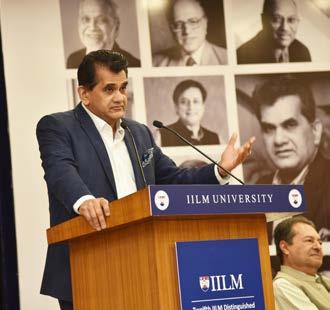
Dr Bhaskar Chatterjee, Senior Director IILM, welcoming and introducing Shri Amitabh Kant as the IILM's 12th Distinguished Global Thinker
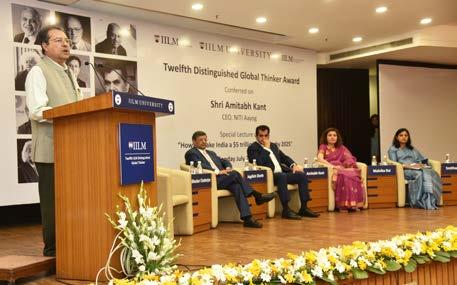
of doing business India will grow rapidly. Globalization Irrespective of this talk of protectionism around the world it is very important that India pushes aggressively for globalization. No country in the world has grown on the back of protectionism. In fact globalization has lifted huge segments of population above poverty line across the world in the last several decades and therefore India must be a very strong advocate of globalization. In the last four to five years we’ve opened up our economy in many areas for foreign direct investment, we have opened up areas from Defence to Real Estate to Housing, E-commerce and Insurance. Our FDI has actually grown by 66 percent at a time when FDI across the world has fallen by 13 percent. I think we need to continue opening up India’s economy so that we get the best technology, the best companies and all the leading entrepreneurs of the world so that India continues to grow and expand and put pressure on the domestic enterprise to also grow and expand and technology spreads across the sectors. I’m a great believer in globalization and of opening up India’s economy to the world. Urbanization If India’s to become a five trillion dollar economy it is very important that urbanization must play a
very critical role. Every minute there are 30 Indians moving from rural areas to urban areas according to the latest McKinsey study and by 2050 you’ll have 500 million Indians getting into the process of urbanization. You see a lot of urbanization but it’s all unplanned unscientific urbanization and the challenge is how to do good planned urbanization. When America urbanized and when the European world urbanized, land, gas and water were all cheaply available. The process of urbanization has just begun in India and for the next five decades there will be more urbanization than in the last 5,000 years. We’ll do it at a point when land, gas and water will all be scarce commodities and therefore we need to focus on how to recycle our water, our waste and how do we do good planned urbanization. Public transportation will really hold the key to the success of India and urbanization because while cities account for just 3% of the earth’s landmass, they account for almost 82 percent of the global GDP. They also account for 78 percent of the CO2 emission and therefore the challenge for India is how to create cities which are innovative and sustainable. Urbanization is critical if India has to grow the urbanization which has to be extremely sustainable and innovative for the future.
Structural Reforms India’s carried out some far-reaching structural reforms - the Goods and Services Tax which actually replaces 17 taxes in the economy is a far reaching reform and this to my mind will lead to a huge formalization of India’s economy in the days to come. The insolvency and bankruptcy code has virtually ended the process of crony capitalism in India. A very major reform is the Real Estate Regulation Act which is a critical Act that brings discipline in the Real Estate sector. The accelerate the pace of growth. India is the only country in the world which has a billion bank accounts, a billion plus mobiles and our mobile data consumption today is more than the mobile data consumption of China and USA put together. India will throw up a huge amount of data and data would be the real driver of growth in the days to come. This will fuel a huge number of fintech to drive innovation and growth. There will be data, machine learning and massive amount of artificial intelligence. We have close
Dr Bhaskar Chatterjee, Dr Jagdish Sheth and Mrs Malvika Rai with Shri Amitabh Kant with the award
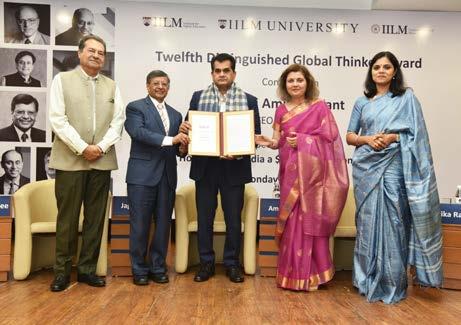
most critical of all the reforms has been the Direct Benefit Transfer Scheme which has led to about 500 schemes where money is directly reaching the beneficiaries. Earlier only 15 percent of the money released by the government actually reach reach the poor persons but today in these 500 schemes 90,000 crores has been saved by the government and almost hundred percent reaches the poor persons because it’s going straight into the bank account from which he withdraws using his biometric. This is a very radical transformation for a country where huge leakages used to take place. These structural reforms slow down economy for two to three years but then they to 600 Indian start-ups working in the field of artificial intelligence and this will enable India to actually lift vast segments of a population using data and artificial intelligence. Ayushman Bharat, GST, Income Tax and the digital payment will throw massive amount of data which will drive the Financial Inclusion and growth of India to cuttingedge technologies in the days to come and this to my mind will be one of the key drivers. How India uses technology to leapfrog will be a key challenge much like what we have done with mobile telephones or Aadhar. It’s important that India gets into the sunrise areas of Industry whether it’s electric vehicles, Giga batteries or the
solar world as these will be the cutting edge areas of the future and India must capture these areas. Start-up Movement India has seen tremendous energy vibrancy and dynamism in its Start-Up Movement which is quite unparalleled. When we began the Startup India Movement most of our start-ups were either going to the United States of America to the Silicon Valley or they were going to Singapore. Today we have seen a reverse movement. Mithra Biotech, a personalized cancer care start-up, was recently relocated from Silicon Valley to Bangalore. I came across this phenomenal starta centre of huge innovation with close to 1400 multinational corporations, their engineering R&D relocated to cities like Bangalore, Hyderabad and Pune. They employ over a hundred and ten thousand Indians just doing engineering and R&D. Indians must have a great sense of pride about the fact that today there’s not a single multinational corporation across the world which doesn’t do its engineering R&D from India. India has been a highly innovative nation and this innovation must spread rapidly across all sectors of Indian economy. Infrastructure Our infrastructure story has just begun and we
Audience listening with attention to Shri Amitabh Kant’s speech
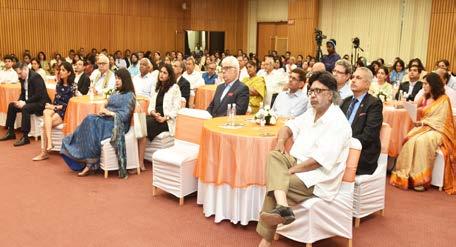
up called Delivery which is actually replacing the India Post and they reach almost 70,000 pin codes and it’s quite unparalleled. Indian start-ups are driving the movement today from storage to swapping to many other areas and the challenge is of converting waste into energy, cleaning water, building flyovers in 40 days and electric vehicles. If these start-ups are able to find solutions for the 1.3 billion people of India, they will be actually finding a solution for the 7.5 billion people of the world. The market is not India but the market is the 7.5 billion people of the world and that’s a huge market. India needs a lot of disruption in the days to come from many of our young people. Innovation India in the last five to six years has become are the only country in the world which is doing a hundred Smart Cities. We are the only country in the world which is doing 50 metros, we are driving a dedicated freight corridor which will connect Delhi to Mumbai. Today it takes 14 days for goods to reach the ports on the western coast of India and by next year end they will reach in 14 hours. So from 14 days to 14 hours will be the paradigm shift. We are doing high-speed train from Mumbai to Ahmedabad and many other projects across India. Therefore India’s physical infrastructure story has also just begun and you will see a lot of worldclass infrastructure being created and it’s a massive opportunity for the rest of the world. Challenges I’ve spoken a lot about what India’s achieved.
higher earnings. Agriculture requires massive structural reforms. We need a second Green Revolution but we also need to move away from paddy and wheat which are consuming massive amount of water. 90 percent of India’s water goes into agriculture states,four percent of land for sugarcane takes up 70 percent of the water. We need to shift to millets,pulses and we need to ensure that these are procured for the largest mid-day meal in Aanganvadis and for our children so that the nutritional standard can improve. This critical change of cropping pattern and change of behaviour in agriculture holds the key to India’s future. No country in the world has grown without being a great exporting nation post world war II whether it was Japan, Korea, or Taiwan. None of them have grown without penetrating American markets. Therefore every Indian businessman should look not at India but the globe and its ability to penetrate global markets. Exports hold the key to our growth and we need to grow rapidly and therefore, to my mind,we need a huge focus on exports. There are states in the South and North that do very well in education, health and nutrition but there are vast parts of India largely in the east which remain backward. It’s not an issue of money, it’s an issue of lack of good governance in these districts. So hundred and fifteen districts hold Let me also dwell a little bit on what are the challenges. There are several challenges which India has to face for this rapid rate of 9 to 10 percent growth over a three decade period. The first and foremost is a huge gender disparity in India - only 28 percent of Indian women work and the worldwide average is 48 percent. If India does not reach that world average of 48 percent, almost half of our working population will not be adding wealth to Indian society. If we are able to take it to the global average of 48 percent it will add seven hundred billion dollar to India’s economy and therefore it’s very important that we focus on health and education of women and we are able to ensure that women are put into leading positions of decision-making so that women can be the key driver of India’s growth. Unless that happens it’ll be very difficult for India to grow and therefore gender parity is critical. No country in the world with 58 percent population living on agriculture can have rapid growth rates without massive structural reforms in the agricultural sector. We’ve put huge constraints on our farmers and we’ve created a whole set of middlemen in the agriculture sector. Unless we provide information and knowledge on the market price, allow technology to flow to our farmers and allow the farmers greater access to markets, it will be very difficult for farmers to enhance their productivity and get
India back and unless these districts grow rapidly and we improve the Human Development Index in these districts, India can never sustain a nine to ten percent growth over a long period of time. Therefore one of the key programs of this government is the aspirational district program where we monitor the performance of these districts. We work on real-time data, we focus on nutrition, health, education, agriculture and skill and we put out data on a real-time basis to the District Collector so that they can compete. They’re all competing and they’re ranked and are awarded on the basis Dr SY Quraishi, Former Chief Election Commissioner of India and Chancellor Designate, IILM with Shri Amitabh Kant
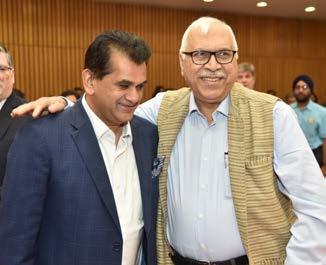
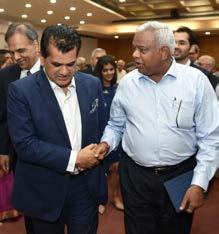
Shri Amitabh Kant with Shri Pawan Jindal
of their performance and those who are doing well are doing extremely well and we find a very major radical transformation in these districts. Our challenge to them is that in the next three years they must perform better than the best districts of the state and in five years perform at par with the best districts in India. So ladies and gentlemen, I’ve given you a perspective of the positives and I’ve given you a perspective of the challenges of India to be able to grow not merely to a five trillion dollar economy by 2024 or a 10 trillion dollar economy by 2030, my perspective is that we must look at a three decade period and lift our population above poverty line and become a key driver of change globally. Let me conclude with these words by this 19th century Indian poet Amir Khusro, a Muslim living in Delhi with Turkish ancestry who wrote in the Persian and said that he counted himself to be the luckiest man to have been born and living in India at that period when a foreigner comes to India where the people teach him to smile like a flower and the foreigner goes back happy. So ladies and gentlemen these are very exhilarating times for India and it’s important to smile like a flower and take India forward. Conclusion Professor Jagdish Sheth, Professor at Goizueta Business School, Emory University, USA, welcomed Shri Amitabh Kant into the select club of IILM Global Thinkers and reiterated Shri Kant’s thoughts when he said, “India has all the ingredients and the time is right for it to grow into a powerful economy.” The event was well attended by distinguished guests and IILM faculty and students who were impressed and inspired by Shri Amitabh Kant’s passionate speech. IILM, which supports Prime Minister Modi’s mission of India becoming a US$5 trillion economy by promoting Employability, Skills and an Entrepreneurial mind-set through quality education, is proud to have Shri Amitabh Kant as its 12th Distinguished Global Thinker.
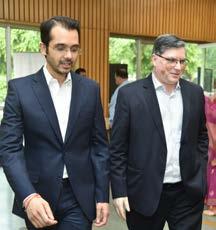
Shri Anand Rai with Shri Dilip Chenoy, MD & CEO of National Skill Development Corporation and Secretary General FICCI
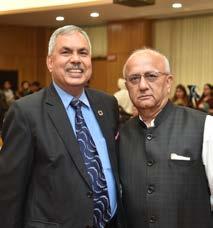
Shri Kamal Singh, Executive Director of UN Global Compact Network India with Major General B D Wadhwa (Retd), Senior Director, IILM










